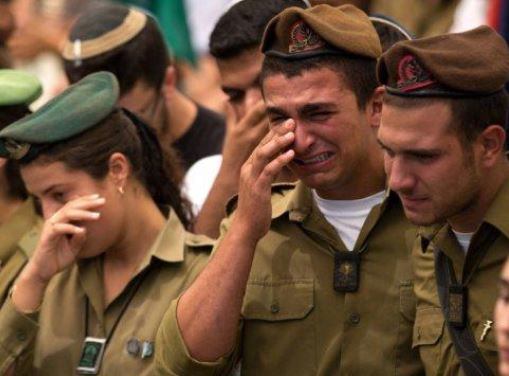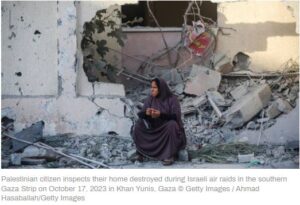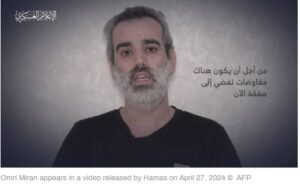
Tentara Israel menangis takut perang melawan Hamas
Israel will send troops into the city of Rafah regardless of whether it reaches a ceasefire and hostage-release deal with Hamas, Prime Minister Benjamin Netanyahu said Israeli Foreign Minister Israel Katz had previously promised to cancel the controversial operation in exchange for the captives.
Situated at Gaza’s southern border with Egypt, Rafah is currently home to an estimated 1.4 million Palestinians who have fled the northern reaches of the enclave. Since October, Israel has carried out regular airstrikes in Rafah against what it claims are Hamas targets, and Netanyahu has threatened for months to launch a ground invasion of the city, despite objections from the US and UN.
“The idea that we will stop the war before achieving all of its goals is out of the question,” Netanyahu said in a statement from his office. “We will enter Rafah and we will eliminate Hamas’ battalions there – with or without a deal, to achieve total victory.”
Foreign Minister Katz had told Israel’s Channel 12 that Israel would “suspend the operation” if Hamas agreed to release some of around 130 Israeli hostages still in its captivity in Gaza.
As Katz spoke, Hamas was studying an Israeli ceasefire proposal that would see fighting temporarily paused so that several dozen hostages could be swapped for Palestinian prisoners in Israeli jails.
US Secretary of State Antony Blinken, who is set to arrive in Israel to discuss the deal later has called its terms “extraordinarily generous,” and called on the militants to “decide quickly” and accept it.
It is unclear how Netanyahu’s comments will affect Hamas’ decision. The militant group has previously rejected Israel’s terms, insisting that any truce must include a path to a permanent ceasefire and a full Israeli withdrawal from Gaza.
Netanyahu’s hardline coalition partners, however, have demanded that the prime minister go ahead with the Rafah operation. Any compromise, Finance Minister Bezalel Smotrich said would amount to a “humiliating surrender” for Israel. During a speech on Monday, Smotrich said Israel should seek the “total annihilation” of its enemies, Israeli media reported.
National Security Minister Itamar Ben-Gvir claimed that Netanyahu had promised him “Israel will enter Rafah, promised that we are not stopping the war, and promised that there won’t be a reckless deal.”
Hamas has released a proof-of-life video of two Israeli hostages, including a US dual citizen. In the footage, the captives urge Israeli Prime Minister Benjamin Netanyahu to strike a ceasefire deal with the Palestinian militants.
Published on Saturday, the undated video depicts Omri Miran, an Israeli, and Kieth Siegel, an Israeli-American dual citizen, speaking to a camera against a nondescript background. Miran says that he has been held for 202 days, indicating that the video was filmed.
Miran describes “living in extremely tough conditions due to the intense bombardment,” while Siegel encourages Netanyahu to “be more flexible in negotiations to reach an exchange deal soon.”
“It’s about time to reach a deal that would bring us back home safe and alive,” Miran adds.
The video concludes with a message to the Israeli public from Hamas: “Your Nazi leaders don’t care about the fate of your imprisoned sons and their feelings. Realize this before it’s too late.”
While Miran and Siegel likely read their statements under duress, their sentiment is shared by organizations representing the roughly 130 hostages thought to remain in Hamas captivity in Gaza. These groups have organized weekly protests in Tel Aviv and Jerusalem demanding that Netanyahu reach a deal with Hamas to release their loved ones.
At a rally in Tel Aviv, Miran’s father called on Hamas leader Yahya Sinwar to “show some humanity” to his son, and implored Netanyahu to approve “any feasible deal” to bring him home.
Saturday’s video was released three days after a similar clip showing injured Israeli-American hostage Hersh Goldberg-Polin. “While you sit and have holiday meals with your families, think of us, the hostages, who are still here in hell,” Goldberg-Polin tells Netanyahu in the video, referring to this weekend’s Jewish holiday of Passover.
Netanyahu has vowed to continue waging war in Gaza until Israel achieves “total victory” over Hamas, and has thus far refused to consider the group’s demand that any ceasefire deal be permanent and include an Israeli withdrawal from the enclave.
Hamas said that it was studying an Israeli ceasefire proposal delivered via Egyptian and Qatari mediators earlier this month. West Jerusalem anticipates an answer from Hamas within the next 48 hours, Israel’s Channel 12 news outlet reported later in the afternoon.
Israel and Hamas agreed to a week-long truce in November, during which 80 Israeli hostages were exchanged for 240 Palestinians held in Israeli jails.
As Israel’s military campaign in Gaza approaches the eight-month mark, the UN warned on Friday that “famine thresholds in Gaza will be breached within the next six weeks” unless Israel allows “massive and consistent” deliveries of food to the besieged enclave. According to the latest data from Gaza’s health ministry, at least 34,388 people have been killed since the Israeli campaign began, most of them women and children.

Israel’s latest ceasefire proposal is “extraordinarily, extraordinarily generous” and should be swiftly accepted by Hamas to spare Gazans from further bloodshed, US Secretary of State Antony Blinken has argued.
“The only thing standing between the people of Gaza and a ceasefire is Hamas,” the top US diplomat said on Monday at a special meeting of the World Economic Forum (WEF) in Riyadh. “They have to decide, and they have to decide quickly. I’m hopeful that they will make the right decision.”
Blinken claimed that the latest ceasefire offer, which was unveiled over the weekend, could lead to a “fundamental change in the dynamic” after more than six months of brutal war between Israel and Hamas. The latest conflict, which was triggered by surprise Hamas attacks against southern Israeli villages on October 7, has left more than 34,000 people dead in Gaza.

The proposal could be the last chance to bring a halt to combat operations before Israel launches a long-threatened ground offensive in Rafah, a city at the southern tip of Gaza, where about 1.4 million civilians have taken refuge. The UN has warned of a humanitarian “catastrophe” if Israel goes through with the Rafah campaign.
Like Blinken, British Foreign Secretary David Cameron described the Israeli ceasefire proposal as “generous.” The offer includes a 40-day initial pause in the fighting and the potential release of thousands of Palestinians who are jailed in Israel, he told the WEF audience.

In exchange, 33 of the approximately 130 Israeli hostages who are still believed to be held captive in Gaza would be freed in the first phase of the ceasefire. The second phase reportedly calls for a “period of sustainable calm,” which would allow for the remaining hostages to be exchanged for more Palestinian prisoners.
Hamas has demanded a permanent ceasefire and the withdrawal of all Israeli troops from the besieged Palestinian enclave. Israel’s compromise offer of “sustainable calm” could largely meet that condition without calling it a permanent ceasefire.
Representatives of Hamas were scheduled to meet with Egyptian and Qatari mediators on Monday in Cairo.





